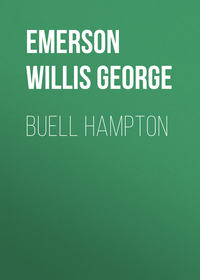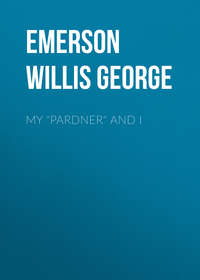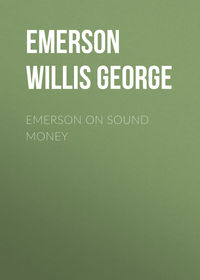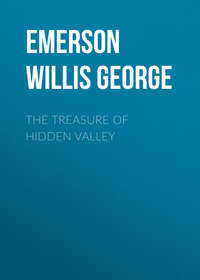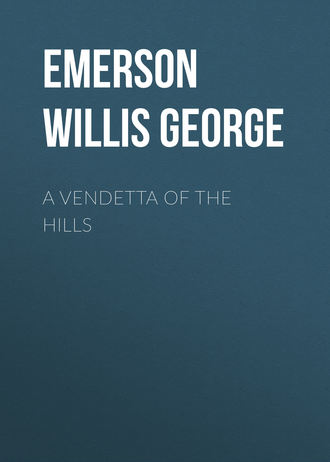 полная версия
полная версияA Vendetta of the Hills
“Great Caesar,” exclaimed the lieutenant, without pausing to give any greeting. “A most surprising thing has happened. When I awoke this morning I found this bag lying on my table. And what do you think it contains?” As he asked the question he dumped the sack on the counter with a heavy thud.
“You’ve got us guessin’,” drawled Tom.
“Ten thousand, five hundred dollars in gold!” announced Munson.
“Good Lord!” ejaculated the sheriff in great surprise.
Munson went on:
“Five thousand dollars are for the French warder at San Quentin who smuggled Pierre Luzon’s letter out of the prison, and the balance is for the syndicate.”
“What syndicate?” gasped Buck, for the moment quite bewildered.
“The Hidden Treasure Syndicate, of course,” exclaimed Jack Rover. “Pierre Luzon has sent each man back the hundred dollars he put up to get him out of the pen, and five thousand dollars extra to divide among us.”
Buck and Tom sprang simultaneously to their feet.
“Hooroosh!” shouted the sheriff. “I always knew there was no yellow streak in old Pierre Luzon.”
“And I always said I liked him, too,” observed Buck. “But come into the parlor, boys,” he went on, with a cautious look around. “Let’s count the money.”
“And divvy it up,” added Tom eagerly. “Gosh ‘lmighty, boys! I’ve never yet seen a thousand dollars in gold at one time outside a bank cashier’s window. And to think there’s that amount cornin’ to me right now!”
“One thousand, one hundred, pal, to be exact,” laughed Jack Rover, lifting the package and following the storekeeper into the sanctum beyond the counter.
The gold was in United States twenty-dollar pieces, bearing dates which showed they had been minted more than twenty years ago.
“Some of Joaquin Murietta’s loot,” remarked Jack Rover, when attention had been drawn to this detail.
“No,” observed Tom Baker, holding up the coin he had been examining, “Murietta wasn’t alive when this ‘ere gold piece came from the mint. This is some of Don Manuel’s stuff.”
“The White Wolf!” exclaimed Munson.
“Yes, the White Wolf,” continued the sheriff. “So if the White Wolf ain’t dead, as Pierre declared that night – ” Tom gazed at the bedroom door as if the spectral figure might reappear – “he’s honorin’ the Frenchie’s sight draft, that’s sure.”
“I see,” said Munson. “He is paying the five thousand dollars old Pierre promised in his letter if he was helped to freedom and five thousand dollars besides.”
“Precisely,” Tom Baker replied. “But if the White Wolf is dead, as most folks say, then the Frenchie’s got the key to the treasure vault, all right.”
“So we’ve got to get him back here again, boys,” murmured Buck, rubbing his hands while his eyes feasted upon the heap of gold. “I don’t mind boardin’ Pierre Luzon for a spell, and he can have all the bourbon he wants.”
“Till he tells us where Guadalupe gets her nuggets,” grinned Jack. “But you’ve forgotten to show ‘em, Munson, the card that came with the coin.”
“Oh, yes,” rejoined Munson, drawing a small piece of pasteboard from his pocket. “It is brief enough. Luzon gives his countryman’s family address in Marseilles where the first five thousand dollars is to be mailed. Then he writes down our five names, Dick Willoughby’s first, and says the five of us are to share equally.” He passed the card to Tom Baker for inspection, and went on: “Jack and I are going to ride over to Bakersfield, get the French bank draft and put Dick’s money in the bank along with our own.”
“Where’s Dick?” asked Buck, with a quick uplift of his eyes into Munson’s face.
But the latter was not to be betrayed into divulging any information that might be in his possession.
“I have not the slightest idea,” he replied airily. “But I feel sure Dick’s all right. He is the sort of fellow well able to look after himself. Meanwhile, Jack and I will attend to his financial interests,” he added with a laugh, as he began to count the gold.
In silence the task proceeded, five thousand dollars first being set aside, and then the balance divided into five separate heaps. When all were satisfied as to the correctness of the distribution, Munson swept the gold back into the sack, except for the two little piles allotted to Ashley and Baker. Then he securely tied the package, ready for the ride to Bakersfield.
“Buck will lock mine in his safe, boys,” exclaimed Tom Baker. “Gosh me, but I’ll want to look at it two or three times a day.”
“Oh, I’m drivin’ over to the bank myself tomorrer,” declared Buck. “I’ve got a bit more to add to this pile.”
“A few handfuls of nuggets, I suppose,” laughed Rover.
“Well, I’ll allow Guadalupe always pays her grocery bills. But this ‘ere store ain’t goin’ to be a safe deposit vault, not on your demed life, with bandits around again. So you’d better arrange to come with me to town tomorrer, Tom.”
“You’ll need me to help you home, perhaps,” grinned the sheriff. “But, I say, Munson, you ain’t told us yet how this sack came to be delivered at your place.”
“There’s a proper mystery for you!” cried Munson. “As I said before, I found the bag this morning, lying on my dressing table. Sing Ling was the only one besides myself in the shack, and he never heard a sound all night.”
“You’re still in Dick’s old home?” asked Buck. “Yes, but I leave tomorrow – have notice to quit, for some surveyor chaps are coming in. I’m moving up to Mr. Robles’ place. He wants me to catalog the books in his library.”
“And Sing Ling?” queried Tom.
“He goes, too. You see, Mr. Robles needs a crackerjack cook, now I’ll be boarding with him,” Munson laughed, gaily. “You don’t happen to have a porterhouse steak about the place, Buck?”
“I can heat you up a can of pork and beans.”
“Nothing doing! Jack and I wouldn’t spoil our appetites with such truck as that. We’re going to set up a chicken dinner in Bakersfield.”
“Chicken and champagne,” chimed in Jack, as he swung the sack over his shoulder.
“You’re beginning to get big bugs these days,” called out the storekeeper as the young men left the room. “Guess, Tom,” he went on, turning to the sheriff, “we could do with a jolt of Kentucky.”
“Make it a bottle of bourbon,” gurgled Tom, “to remind us of our absent friend.”
“Dear old Pierre,” murmured Buck, as he fumbled in his pocket for the key of the safe, his eyes glued all the time on the two little heaps of gold.
CHAPTER XXII – Underqround Wonders
Dick Willoughby was in a way happy in his retreat. At first he had been inclined to regret the jail delivery – it might have been the manlier part to have faced the music and cleared his name before the whole world. But then he reflected on the uncertainties of a trial, the cases of innocent men having suffered because of damning circumstantial evidence piled up against them, the vindictiveness of Ben Thurston and the undoubted power of his money to press the criminal charge by every unscrupulous means. So Dick soon came round to the belief that he might be safer for the time being in the guardianship of the White Wolf than at the mercy of a fallible jury.
Then there was Merle Farnsworth to consider. Yes; to have brought her into a public court, to have allowed her to plead for him by telling the story of Marshall Thurston’s loathsome advances – that was a thing that could never have been tolerated. The leader of the jail-breaking gang had been right; Dick owed it to Merle to save her from such a cruel ordeal.
Finally Dick’s contentment over his change of quarters was completed when Pierre Luzon appeared with a superb equipment of drawing instruments and materials. There was no time to worry now over surmises as to the wisdom of this course or the other course. Work lay to his hand – work of the most absorbing and delightful kind; and with all the ambitious enthusiasm of his temperament he tackled it whole-heartedly there and then. Hour after hour, day after day, Pierre watched in contemplative silence the methodical advancement of the task to which the young architect had applied himself.
But there were frequent intervals for conversation, sometimes in French, sometimes in English, as the mood prompted. Occasionally Pierre drifted into semi-confidential reminiscences, and Willoughby soon came to know in close detail the story of Don Manuel’s life – the tragedy of his sister Rosetta’s death, the vow of vengeance against Ben Thurston, the early bandit days when the White Wolf counted every gringo in the land his natural enemy, the often hairbreadth escapes of the outlaw, his sublime courage and nerve in the direst emergencies.
“Don Manuel was one great man,” remarked Pierre at the close of one of these confidences – the phrase was a favorite one with the old Frenchman. “Many and many a time he could have shot his enemy from a distance and got away. But Don Manuel had vowed zat he would kill him hand to hand – zat ze villain must die with a last malediction in his ear, and knowing zat it was he, ze White Wolf, who in ze end had revenged his sister’s shame.”
“He felt, too, didn’t he, that his father had been wronged in being driven from San Antonio Rancho?”
“Sure – zat was another great wrong – zat was why Don Manuel was so bitter against all ze Americans. But he made zem pay for ze land many and many times over.” Then Pierre, as was now his custom in Dick’s presence when speaking at any length, lapsed into French as he continued: “But the White Wolf was a man of high honor. He never used any of the proceeds of his robberies for himself. True, he spent the money to pay his band, to pay the numerous scouts and spies whose services he secretly retained, to plan and accomplish further hold-ups, to defy and outwit the authorities. But on his own needs – never – not one dollar!”
Pierre went on to explain that after Ben Thurston had fled from California and kept away in hiding, Don Manuel had visited Spain, to claim the family estates in Valencia to which his father’s death had left him the sole heir. These he had sold for many millions of dollars, and most of that money he kept in banks in London and Paris. So he was a very rich man, and had no need to rob anyone except to gratify his vengeance. Even the hoarded gold of Joaquin Murietta he had never touched. It remained intact today in the treasure vault of the cave, boxes and sacks of gold and jewels.
“Won’t I be allowed to see this wonderful treasure?” asked Dick, half jesting.
“Perhaps, some day, if the White Wolf chooses to show you. But it is not for me to do that – I swore an oath of secrecy when the White Wolf trusted me – me and Felix Vasquez, who was also his confidant. But Vasquez was killed at Tulare Lake. So now only we two know the secret, and until the White Wolf himself dies my lips are sealed by the solemn oath I swore to the Virgin Mary.” The old man crossed himself devoutly.
“Then where does the White Wolf live now?”
“Ah, that is another secret. Again I would break my oath if I spoke one word.”
“And Guadalupe – does she know these things?” asked Dick in English.
“Guadalupe? Oh, no,” responded Pierre, politely adopting the change of language, “she is just one servant, our cook – one very excellent cook, as monsieur knows – and ze guardian of ze cave. For ze real white wolf guards Guadalupe – ze big animal is just like one tame dog to ze old squaw, but with his fierce jaws he would kill anyone who dared to approach her or come near ze hidden entrance to zis cavern. No man can ever find zat while ze white wolf is alive. In ze old days he killed several men when zey dared to follow Guadalupe.”
“Then the white wolf must be very old?”
“As old as Guadalupe – as old as the Tehachapi mountains,” exclaimed Pierre, again crossing himself and thereby revealing the superstitious dread in which he held the savage animal.
“But you can pass the white wolf, can’t you?’ asked Dick.
“Never – except when Guadalupe give permission. Then ze wolf lies down and I can come out of ze cave or enter. Ah! ze white wolf is one terrible beast. But he never shows his teeth to Don Manuel. Only Don Manuel can pass when Guadalupe is not there.”
“Then where is Guadalupe’s riffle of gold – where is the lake of oil about which you told Tom Baker?”
“Come, I will show you zese,” replied Pierre. As he rose he picked up the lantern he usually carried.
Dick jumped to his feet with alacrity and followed his guide.
They crossed the main cavern, then entered another side gallery. This had many windings and from it ran several diverging rock corridors. But Pierre led the way unfalteringly.
Fully half a mile must have been traversed when at last the Frenchman halted and swung his lantern aloft.
“Zere!” was all he said.
Dick followed the flash of the lantern, and there before him was a dark pool stretching away indefinitely into the blackness beyond. He bent down and scooped up a little of the fluid in his palm. It was a brown oil, as thin as water, and therefore capable of use without any refining process.
“Great Scott, this is wonderful!” exclaimed Dick in profound amazement.
“Very wonderful,” concurred Pierre. “In zis cavern are oil and water, also gold – Guadalupe’s gold. Ze gold is close to here. Come.”
Pierre turned and again led the way through dark and winding corridors. At a little distance Dick became conscious of the purling of a running stream. Pierre stopped once more, but this time held the lantern close to the ground.
“Here Guadalupe come to wash out ze nuggets of gold, and since I have been in prison she buy with zem, so Mr. Baker say to me, groceries at ze store. Don Manuel, when I tell him, he very angry – she never do zat again.”
“Poor old Buck Ashley!” laughed Dick. “He lost you, Pierre, and now he’ll be losing his best paying customer, too.”
While speaking, he knelt and dipped his hands into the stream, bringing up some gravel into the lantern rays. But Pierre shook his head.
“You no find ze gold. Guadalupe wash many hours to get, perhaps, just one nugget. But there is heaps and heaps, if ze miners came with spades and cradles.”
“Great guns, there must be the reef, too, from which the nuggets have come!” exclaimed Dick, rising erect and dropping the handful of pebbles.
“Now, we must go back,” said Pierre, “for zis evening you are to be allowed to come for a ride with me down ze mountains.”
“You don’t say?” Dick cried, surprised and delighted.
“Yes; Don manuel he send word today that he give permission. But you must wear ze bandage round your eyes, and you must promise to return when I give ze word.”
“Don’t for one moment think, old fellow, that I would leave my drawings. But where are we going tonight?”
“To La Siesta,” replied Pierre.
“Hurrah!” shouted Dick. “Hurry up, Pierre! I’m mighty glad you got me those ties and things from Los Angeles. You say you can give me a hair-cut?”
“Ze old-time bandit learned to trim ze hair of his friends as well as ze pocket-books of his enemies,” was the laughing answer.
CHAPTER XXIII – The Unexpected Visitor
MOST of the cattle had been driven off the land. The vaqueros had dispersed to the four points of the compass. Chester Munson had vacated his room in Dick Willoughby’s old home, and had taken up his residence and library duties at Mr. Robles’ mansion on the hill. Sing Ling had folded his tent like the Arab and silently stolen away in the same direction. A small army of surveyors had appeared on the scene and were quartered in the rancho buildings.
The only one of the old-timers who still lingered on was Ben Thurston, more gloomy and morose than ever, seldom stirring out of doors now, but conducting all his business by telephone or through the agency of the sleuth, Leach Sharkey, his only companion.
Jack Rover had pitched his camp temporarily at the store. Buck Ashley had assigned him Pierre’s cot, but the cowboy had fixed it under a wide-spreading sycamore, preferring to sleep in the open rather than share the grocery-perfumed atmosphere of the store building.
Tom Baker was around most of the time. The three men clung together with a vague sense that they had a common interest in the vast treasure which had so far eluded them, but which might any day come again within reach of their eager claws. It afforded an endless theme of conversation, varied by talk about the passing of the rancho and all the train of changes which were bound to follow the close settlement of the valley.
One morning Jack Rover found Buck at the door of the store, with a pair of antiquated-looking field glasses at his eyes.
“Where did you get the goggles, Buck?” asked Jack.
“Oh, I rummaged ‘em out of a trunk – had almost forgot I had the blamed things. But we used to keep a sharp lookout in the old bandit days – got kinda ready for any suspicious lookin’ riders on the road.” He had spoken while still peering through the binoculars, but now he turned to Jack and proffered him the glasses. “I do wonder what ‘n hell we’re all cornin’ to anyway. This here ranch that we’ve bragged up as bein’ the biggest in all California! Ugh!” The grunt was one of unspeakable disgust. “Take a look for yourself.”
Jack turned the glasses in the direction Buck had been gazing, and began to adjust the focus.
“What’s the matter now?” he asked.
“Matter ‘nough,” growled the storekeeper. “San Antonio Rancho is goin’ to the dogs. Do you see them specks away out yonder in the valley? That’s another band of surveyors. One feller’s peekin’ through a spy-glass set on a tripod; another feller goes ahead and puts up tall stakes with big figgers on ‘em, and the other fellers are chainin’ off the distances. This ‘ere ranch ‘ll surely look like a checker-board blamed soon.”
“Progress,” said Jack, laconically.
“Progress, hell!” snapped Ashley. “These new fellers that bought the ranch have sure ‘nuff driv’ off all the cattle and now they’re dividin’ up the land. I bet they’ll take the postoffice away from me – not that it pays much, for the Lord knows it don’t – but it brings customers to my store.”
“Well, Buck,” said the cowboy, consolingly, “there are lots worse things than moving a postoffice. What’s to prevent your setting up the finest grocery store in the new model city the advertisements speak about?”
“That would suit me fine, wouldn’t it?” cried the old storekeeper, with scathing contempt. “Goin’ around in a biled shirt, and handin’ out pencils and chewin’ gum to the little school gals that’ll be swarmin’ all over the place. Not on your life, Jack! I’ll be losin’ both my postoffice and my store in these new-fangled times.” He paused a moment, then his tone changed to one of aggressiveness. “However, they ain’t built their doggoned new town yet, and it’s my belief all this boom talk is just so much hot air.”
“In any case you won’t need to worry, Buck, after we get on the tracks of Pierre Luzon again. I intend to find the old squaw’s sand-bar, or my name isn’t Jack Rover.”
“And I betche I’m a-goin’ to find Joaquin Murietta’s cache,” concurred the old man with equal determination.
Just then Tom Baker slouched out of the store, where he had overheard the conversation.
“Oh, things are a-goin’ to turn out all right in the end, boys, don’t fret over that. And there’s one thing gol-dern certain, there’ll be some great things doin’ in this ‘ere valley once they get started on buildin’ the town. The new place will just spring up like Oklahomy City, or Liberal, Kansas, or some of them big towns that had twenty thousand people livin’ in ‘em inside o’ thirty days from the time they were surveyed and laid out.”
“That seems quite impossible,” commented Jack.
“Not impossible by a derned sight. My brother was at Liberal, Kansas, down there on the Rock Island, near No Man’s Land, you know. The new town had been talked of and talked of for mebbe three or four months, just as this new town is bein’ talked about today. Then finally the mornin’ came when the new town of Liberal was to be opened up. There was to be a regular town openin’, so to speak, and a sale of lots. Why, great guns, when the management of that town company rode into the station, on the early train, they found more’n ten thousand people right there campin’ in covered wagons, tents and all that sorta business, just awaitin’ for the auctioneerin’ to start.”
Tom paused to take a fresh chew of tobacco and then rambled on:
“I tell you, boys, that within thirty days there was twenty thousand people livin’ in that ‘ere town. Two banks were established, and one of them had one hundred and eighty-five thousand dollars in deposits, too. Oh, there’s lots of people who remember the rush to Liberal, and the boomin’ of Oklahomy City also. And history’s fixin’ to repeat itself right here on this ‘ere ranch. Things will be sizzlin’ when the town site is finally located and the rush starts pourin’ in from Portland, Oregon, on the north, to San Diego on the south, with a few thousands from Texas and other states this side o’ the Rocky Mountains. They’ll sure be great doin’s when the Los Angeles syndicate announce they’ve awarded to some feller that ten-thousand-dollar prize for the best plans for their ideal city, as they keep on callin’ it.”
“Munson and I were speaking about the contest and the prize,” remarked Jack, “and were saying that if Dick Willoughby were only here, he’d about win, hands down. You know he was an architect once, before he came West.”
“Dick Willoughby,” snorted Ashley, “How can he compete when he don’t know anything about the blamed business? He’s hid away, right enough.”
“Munson knows a thing or two,” remarked Tom Baker. “If he’d only apeak, he could tell us where Dick is. That’s my opinion.”
“And there once again you’re dead wrong,” retorted Jack, warmly. “If Munson only knew where Dick is hiding, he would have got that very prize competition advertisement into his hands long before now. He’s sore because he can’t send Dick the word. Where is Dick Willoughby? By gad, it’s a mystery.”
“I guess you’re right,” said the sheriff. “That sort o’ exonerates Munson from keepin’ things from his partners. I think I owe it to Chester Munson to drink his health – just for ever doubtin’ him. What shall it be, boys?”
And the open-air meeting adjourned.
It was the very evening of the day on which this conversation had been held in Buck Ashley’s store that Dick Willoughby rode forth from the cavern blindfolded and under the guidance of Pierre Luzon. For the first hour progress was slow – round many turnings, down steep declivities, with just here and there a few miles of easier trail. But then there had been a swift canter for another hour over grass land, and now at last the riders were upon a well-made road. Dick divined that this must be the highway leading to La Siesta, but from what point of the compass they had come he had not the remotest conception.
Very soon Pierre Luzon, still riding ahead with the leading rein, came to a halt.
“Here we are. Dismount, please,” he said. “You are free to remove ze bandage.”
Dick looked; they were right below the knoll on which the Darlington home stood. Lights were gleaming from the windows. Dick could even hear the faint tinkle of the piano.
“I hide ze ponies here in zis little grove of trees,” Pierre continued, pointing to a coppice not fifty yards from the main road. “In two hours’ time, at eleven o’clock” – Pierre looked at his watch in the bright moonlight – “monsieur will return. I have your word?”
“My word as a gentleman, Pierre,” exclaimed Dick, extending his hand. “So long then, old fellow. I’ve got to make the best use of my time.”
The piano playing stopped abruptly when Willoughby, unannounced, appeared at the door of the music room.
“Dick!” exclaimed Merle delightedly, leaving the instrument and rushing toward him. If they had been alone Dick felt that right then she would have jumped into his arms. But at the distance of a few paces she halted and clasped her hands.
“How ever did you get here, Mr. Willoughby?” she asked intensely.
“I rode here,” he answered, as they shook hands. “But it is only a brief visit. Hallo, Miss Grace! I’m delighted to see you again. And you, Ches, old sport – why this is great luck to find you here! Mrs. Darlington, I’m mighty glad to see you all once more.”
The whole bevy were crowding around him, shaking hands and expressing their joyful surprise.
“We knew you were safe, that was all,” explained Munson.


